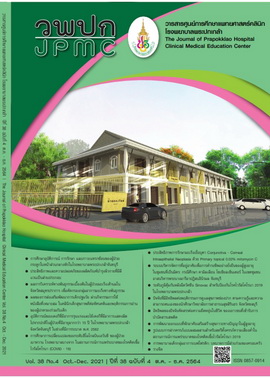Nursing Care of Children with Nephrotic Syndrome: Role of Family Participation
Main Article Content
Abstract
Nephrotic syndrome is a chronic disease in children. Eighty percent of nephrotic syndrome cases occur in preschool - aged children (less than 6 years of age). The ratio between boys and girls is approximately 2 to 1. Nephrotic syndrome requires long-term treatment and can be recurrent. Nephrotic syndrome is one of the disorders of the blood vessels in the kidneys caused by an abnormal immune system. Glomerular damage results in large proteins leaking into the urine, hypoalbuminemia, periorbital edema in the morning, and leg swelling in the late morning as well as a cholesterol level greater than 250 mg/dL. The treatment of nephrotic syndrome includes medication and nutritional therapy. Children should maintain a low salt diet with no fish sauce added, and they should increase their protein intake. Furthermore, children should take medications regularly, and they should not reduce or stop taking medication without consulting a doctor. The medication should be taken immediately after meals to decrease gastric irritation. Moreover, infection prevention must be controlled carefully. The most common medical problem is lack of knowledge and self - care practice, both of which cause complications and may lead to relapse of the disease. These issues may increase the severity of the disease and may lead to death.
The concept of family participation plays an important role in promoting the health of children with nephrotic syndrome and their families to continuity of care, recurrent prevention, and slow progression of the disease to end - stage renal failure.
Article Details
References
Weraarchakul W, Weraarchakul W, Wisanuyotin S, Jiravuttipong A, Worasarn W, Nattee J.Childhood kidney disease at Srinagarind Hospital, Khon Kaen University, Khon Kaen province : a pilot study. Srinagarind Med J 2014;29:101-7.
Naylor GD, Fredericks MR. Pharmacologic considerations in the dental management of the patient with disorders of the renal system. Dent Clin North Am 1996;40:665-83.
De Rossi SS, Glick M. Dental considerations for the patient with renal disease receiving hemodialysis. J Am Dent Assoc 1996;127:211-9.
Proctor R, Kumar N, Stein A, Moles D, Porter S. Oral and dental aspects of chronic renal failure. J Dent Res 2005;84:199-208.
Davin JC, Rutjes NW. Nephrotic syndrome in children: from bench to treatment. Int J Nephrol [Internet]. 2011[cited 2021 Feb 21];2011:372304. Available from: https://downloads.hindawi.com/journals/ijn/2011/372304.pdf
Wisanuyotin S. Kidney disease common in children. Khon Kaen: Clung Nana; 2014.
Coyne IT. Parent participation: a concept analysis. J Adv Nurs 1996;23:733-40.
O'Connor S, Brenner M, Coyne I. Family-centred care of children and young people in the acute hospital setting: a concept analysis. J Clin Nurs 2019;28:3353-67.
Quaye AA, Coyne I, Söderbäck M, Hallström IK. Children's active participation in decision-making processes during hospitalisation: an observational study. J Clin Nurs 2019;28:4525-37.
Hahn D, Hodson EM, Willis NS, Craig JC. Corticosteroid therapy for nephritic syndrome in children. Cochrane Database Syst Rev [internet]. 2015[cited 2020 Dec 29]. Available from: https://www.ncbi.nlm.nih.gov/pmc/articles/PMC7025788/pdf/CD001533.pdf
Sun L, Xu H, Liu HM, Zhou LJ, Cao Q, Shen Q, et al. Long-term follow-up of 101 cases with pediatric lupus nephritis in a single center in Shanghai. Zhonghua Er Ke Za Zhi 2011; 49:819-24.
Samakkeethum O, Danwilai K. Assessment of adherence in children nephrotic syndrome at outpatient pharmacy Queen Sirikit National Institute of Child Health. Journal of the Department of Medical Services 2017;42(6):88-95.
Zrinyi M, Juhasz M, Balla J, Katona E, Ben T, Kakuk G, et al. Dietary self-efficacy: determinant of compliance behaviours and biochemical outcomes in haemodialysis patients. Nephrol Dial Transplant 2003 Sep;18:1869-73.

